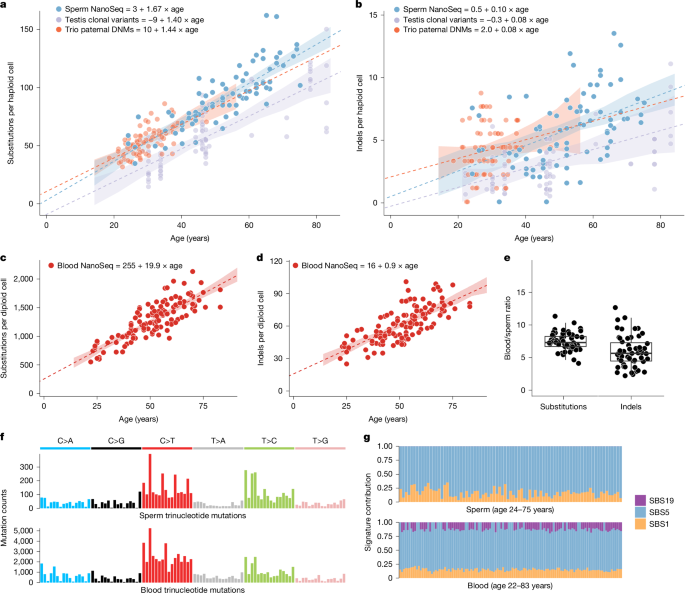
"All human cells accumulate mutations throughout life. In proliferating tissues, acquired driver mutations that confer a selective advantage can promote the expansion of individual clones in competing stem and progenitor cell populations. Although patterns of selection and clonal expansion have been extensively studied in cancers, recent research has also highlighted their occurrence in normal tissues during ageing6,7,8,9,10,11,12,13,14. Spermatogonial stem cells of the testis occupy a distinct niche relative to other studied normal tissues."
"Among replicating cells, these stem cells have the lowest mutation rate, which is around 5-20-fold lower than other studied somatic cell types12. They are also the only adult proliferating cells with the potential to transmit mutations to offspring, balancing self-renewal and spermatogenesis to produce 150-275�million sperm per day15,16. Targeted sequencing studies have revealed that driver mutations are acquired in spermatogonial stem cells and that these cell populations expand along seminiferous tubules, which results in increased fractions of mutant clones that are detectable in sperm1,17,18,19,20."
"Notably, all the male germline drivers identified so far are activating missense hotspot mutations, which contrasts with the broader range of activating and inactivating drivers observed in cancers and somatic tissues. These germline driver mutations can have substantial implications for offspring, as such mutations are found in a set of 13 genes all known to cause severe developmental disorders3. This effect leads to a significant increase, up to 1,000-fold, in the sporadic birth prevalence of these disorders,"
All human cells accumulate mutations over life. In proliferating tissues, driver mutations that confer selective advantages can cause clonal expansion among stem and progenitor cells. Spermatogonial stem cells have the lowest mutation rate among replicating cells, roughly 5–20-fold lower than other somatic types. These stem cells uniquely transmit mutations to offspring and produce 150–275 million sperm daily. Targeted sequencing shows driver mutations arise in spermatogonial stem cells and expand along seminiferous tubules, increasing mutant clone fractions detectable in sperm. All identified male germline drivers are activating missense hotspot mutations linked to 13 genes causing severe developmental disorders, with prevalence rising markedly with paternal age.
Read at Nature
Unable to calculate read time
Collection
[
|
...
]